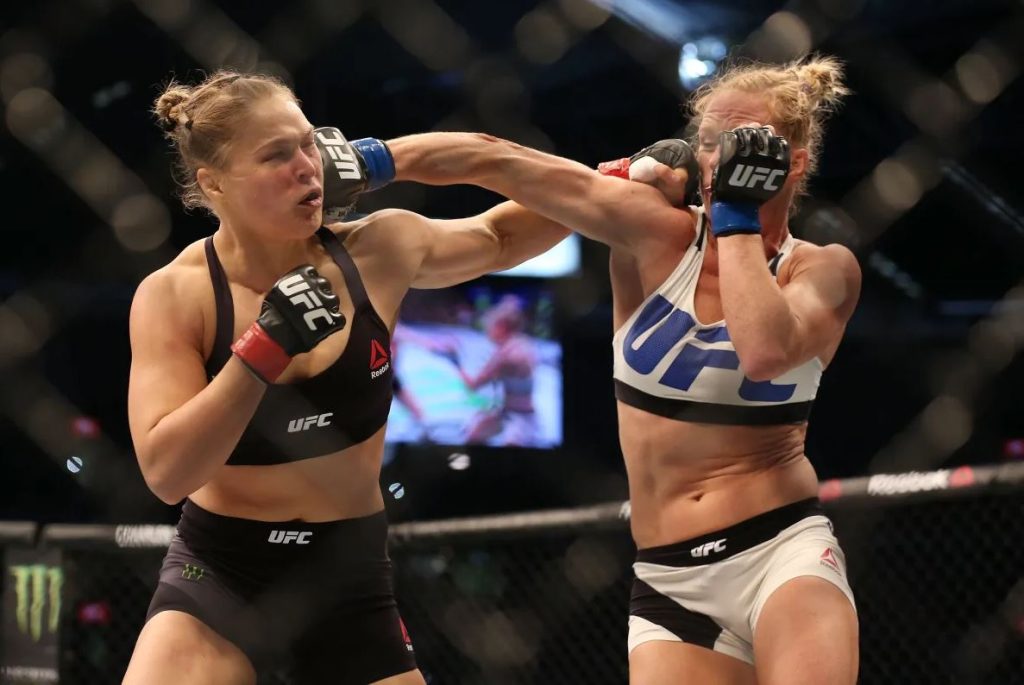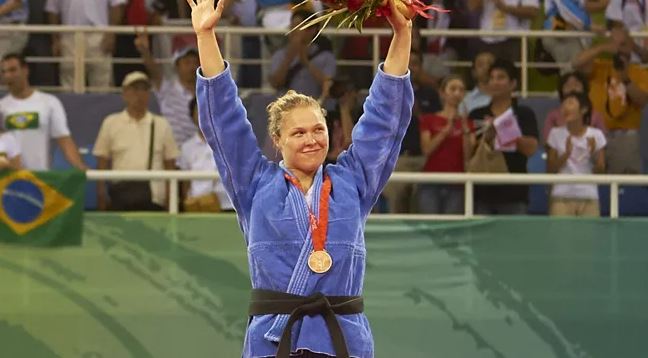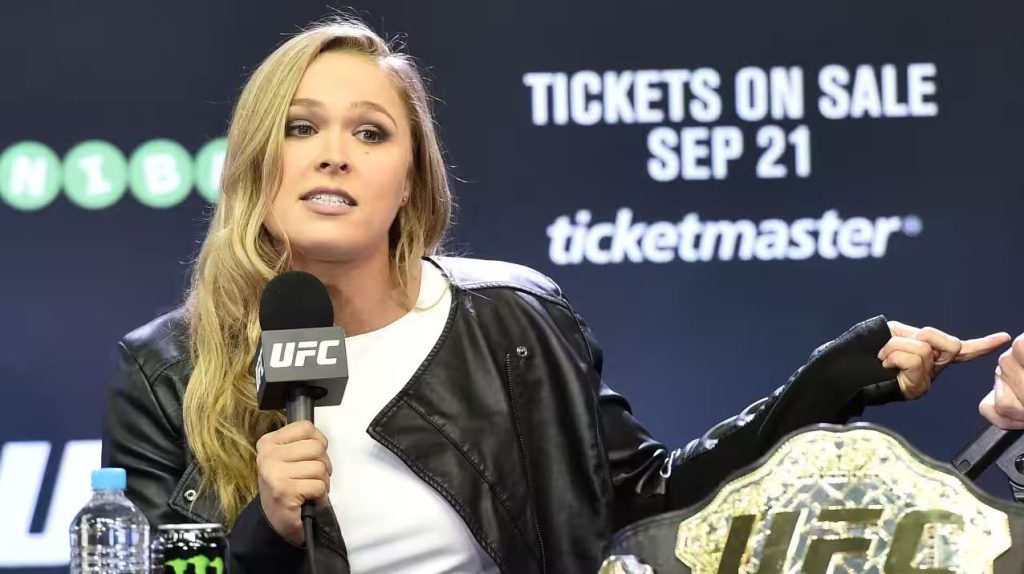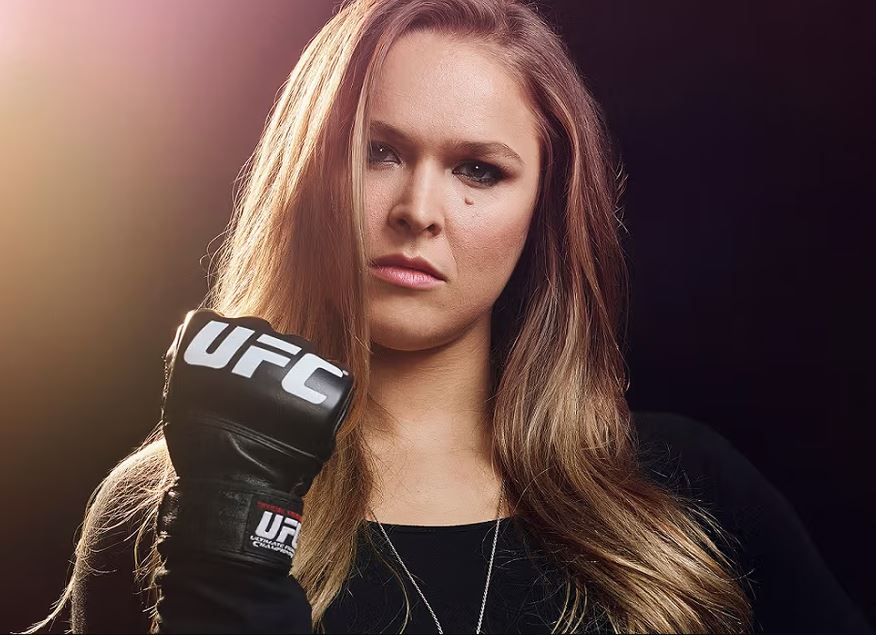In 2018, Ronda Rousey made history once again—this time not inside the Octagon, but by stepping into a more enduring spotlight. She became the first woman ever inducted into the UFC Hall of Fame, solidifying her legacy as one of the sport’s most transformative figures.
Though her professional MMA career spanned just a few years, Rousey’s impact transcended fight records. She didn’t merely win; she redefined what was possible for women in mixed martial arts and reshaped the business model of the UFC itself. Her induction wasn’t just symbolic—it was foundational.
Paving the Way: The Early Barriers
Before Ronda Rousey entered the UFC, women’s MMA wasn’t even on the roster. UFC President Dana White famously declared in 2011 that women would “never fight in the UFC,” citing a lack of depth and marketability in the women’s divisions. Just over a year later, Rousey would sign with the promotion, forcing a pivot not just in White’s thinking, but in the future of the sport itself.

Rousey came into the UFC in 2012 as its first female signee and was instantly crowned inaugural Women’s Bantamweight Champion. She was the main event in her debut UFC fight—a privilege not typically granted to newcomers, much less first-time female competitors. Her bout against Liz Carmouche at UFC 157 proved that not only could women fight at the highest level, but they could also headline major pay-per-view events and sell tickets.
An Unmatched Start in the Octagon
Rousey’s dominance in the early stages of her UFC career was both startling and captivating. She racked up six consecutive wins in the promotion, all by stoppage, and most of them within the first round. Her signature move, the armbar, became both a threat and a prediction; audiences came to expect her to win, and quickly.
Between 2013 and 2015, Rousey defeated opponents like Miesha Tate, Sara McMann, and Cat Zingano in increasingly shorter bouts. Her 14-second victory over Zingano at UFC 184 still stands as one of the fastest title fight wins in UFC history. She wasn’t just winning—she was rewriting the sport’s tempo.
In many ways, Rousey became the UFC’s first female superstar, transcending the sport with mainstream visibility. Her popularity opened doors for other fighters—helping create new divisions, more opportunities, and a new fan demographic. Sponsorships, movie roles, and media appearances followed, elevating both her profile and the UFC brand.
Cultural Impact Beyond the Cage
What set Rousey apart from many of her contemporaries wasn’t just her athleticism or technique—it was her narrative. A former Olympic bronze medalist in judo, Rousey brought a decorated athletic background and an uncompromising confidence to the sport. She was outspoken, unapologetic, and consistently authentic.

Her rise coincided with broader conversations around gender representation in sports and entertainment. Rousey’s success became a talking point not just in MMA circles, but also in cultural commentary around what it meant to be a strong, competitive woman in traditionally male-dominated spaces.
Rousey graced magazine covers, starred in action films like Furious 7 and The Expendables 3, and became a role model—though not without controversy—for young women around the world. Her ability to draw both admiration and criticism helped keep women’s MMA at the center of conversation, long after the fight nights ended.
The Fall and the Aftermath
Rousey’s career, however, wasn’t without setbacks. Her shocking knockout loss to Holly Holm in November 2015 at UFC 193 marked a turning point. It was the first time fans saw her vulnerable—physically and emotionally. The bout was followed by a lengthy absence from the sport and a much-anticipated, but ultimately unsuccessful, comeback attempt against Amanda Nunes in December 2016.
After two consecutive losses, Rousey quietly stepped away from MMA, later transitioning to professional wrestling with WWE. While some fans debated her legacy based on her abrupt exit from the sport, others recognized that her impact had already been cemented.
The UFC’s women’s divisions—once considered unlikely—were now permanent. Fighters like Amanda Nunes, Valentina Shevchenko, and Zhang Weili had platforms that simply didn’t exist before Rousey. The landscape had been permanently altered.
Hall of Fame Recognition: A Moment of Validation
On July 5, 2018, during the UFC Hall of Fame ceremony in Las Vegas, Ronda Rousey was officially inducted into the Pioneer Wing. The decision was more than ceremonial. It acknowledged that Rousey had done more than just win fights—she had pioneered a movement.
In her induction speech, Rousey spoke candidly about the doubts she had faced and the perseverance it took to prove that women belonged in the UFC. “I am not the first person who had the ability to do this,” she said, “but I am here because I am the first person you all took the time to watch.”
The quote underscored a key part of her legacy: she didn’t invent women’s MMA, but she made it impossible to ignore.

Legacy That Endures
Years after her final fight, Rousey’s influence continues to be felt across combat sports. Every time a woman headlines a UFC card, or a young athlete trains in judo dreaming of MMA glory, Rousey’s shadow lingers in the background.
Beyond the Octagon, she helped mainstream the idea that athletic women can be cultural icons, not just competitors. She was bold, flawed, and intensely driven—a combination that made her relatable to some and polarizing to others, but unforgettable to all.
Her Hall of Fame induction ensured that future generations of fighters and fans would not just remember her record, but also her revolutionary role.
Conclusion
Ronda Rousey’s UFC Hall of Fame induction is more than a personal milestone—it’s a recognition of a transformative era in MMA history. As the first woman to be honored with this accolade, she stands as a testament to how quickly and profoundly one individual can change an entire sport.
In a realm built on physicality, Rousey’s greatest contribution may have been ideological. She proved that women not only deserve a place in the cage—they can dominate it, headline it, and leave it forever changed.
Read also: Cole Escola – Tony-Winning Actor Who Played Mary Todd Lincoln in Oh, Mary!
